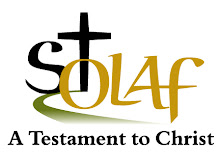from: http://www.americancatholic.org/Features/Saints/saint.aspx?id=1449&calendar=1
A contemporary of the American Revolution, Francisco Garcés was born in 1738 in Spain, where he
joined the Franciscans. After ordination in 1763, he was sent to Mexico. Five years later he was
assigned to San Xavier del Bac near Tucson, one of several missions the Jesuits had founded in
Arizona and New Mexico before being expelled in 1767 from all territories controlled by the
Catholic king of Spain. In Arizona, Francisco worked among the Papago, Yuma, Pima and Apache
Native Americans. His missionary travels took him to the Grand Canyon and to California.
Father Garcés was greatly loved by the indigenous peoples among whom he lived unharmed for a
long time. They regularly gave him food and referred to him as “Viva Jesus”, which was the greeting
he taught them to use. For the sake of these indigenous converts, the Spanish missionaries wanted
to organize settlements away from the Spanish soldiers and colonists. But the commandant in
Mexico insisted that two new missions on the Colorado River, Misión San Pedro y San Pablo and
Misión La Purísima Concepción, be mixed settlements.
A revolt among the Yumas against the Spanish resulted in the deaths of Friars Francisco Garcés,
Juan Barreneche, Juan Diaz, and Matias Moreno. Ultimately, it was government interference in the
missions and land-grabbing that sparked the Indian uprising which cost these friars their lives.
Comment:
In the 18th century the indigenous peoples of the American Southwest saw Catholicism and Spanish
rule as a package deal. When they wanted to throw off the latter, the new religion had to go also. Do
we appreciate sufficiently the acceptable adjustment our faith can make among various peoples? Are
we offended by the customs of Catholics in other cultures? Do we see our good example as a
contribution to missionary evangelization?



